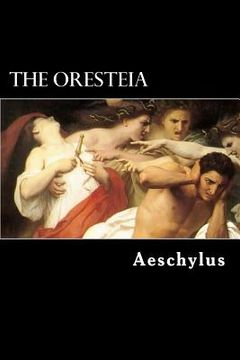Compartir
The Oresteia: The Agamemnon, The Libation-Bearers and The Furies (en Inglés)
Aeschylus
(Autor)
·
Createspace Independent Publishing Platform
· Tapa Blanda
The Oresteia: The Agamemnon, The Libation-Bearers and The Furies (en Inglés) - Morshead, E. D. a. ; Aeschylus
$ 16.530
$ 33.050
Ahorras: $ 16.520
Elige la lista en la que quieres agregar tu producto o crea una nueva lista
✓ Producto agregado correctamente a la lista de deseos.
Ir a Mis Listas
Origen: Estados Unidos
(Costos de importación incluídos en el precio)
Se enviará desde nuestra bodega entre el
Viernes 09 de Agosto y el
Miércoles 21 de Agosto.
Lo recibirás en cualquier lugar de Chile entre 1 y 3 días hábiles luego del envío.
Reseña del libro "The Oresteia: The Agamemnon, The Libation-Bearers and The Furies (en Inglés)"
The Oresteia is a trilogy of Greek tragedies written by Aeschylus which concerns the end of the curse on the House of Atreus. When originally performed it was accompanied by Proteus, a satyr play that would have been performed following the trilogy; it has not survived. The term "Oresteia" may have originally referred to all four plays, but today is generally used to designate only the surviving trilogy. The only surviving example of a trilogy of ancient Greek plays, the Oresteia was originally performed at the Dionysia festival in Athens in 458 BC, where it won first prize. A principal theme of the trilogy is the shift from the practice of personal vendetta to a system of litigation. The name derives from the character Orestes, who sets out to avenge his father after his mother's affair with Aegisthus. Aeschylus (circa 525 BC - 455 BC) was the first of the three ancient Greek tragedians whose plays can still be read or performed, the others being Sophocles and Euripides. He is often described as the father of tragedy: our knowledge of the genre begins with his work and our understanding of earlier tragedies is largely based on inferences from his surviving plays. According to Aristotle, he expanded the number of characters in plays to allow for conflict amongst them, whereas previously characters had interacted only with the chorus. Only seven of his estimated seventy to ninety plays have survived into modern times.
- 0% (0)
- 0% (0)
- 0% (0)
- 0% (0)
- 0% (0)
Todos los libros de nuestro catálogo son Originales.
El libro está escrito en Inglés.
La encuadernación de esta edición es Tapa Blanda.
✓ Producto agregado correctamente al carro, Ir a Pagar.

